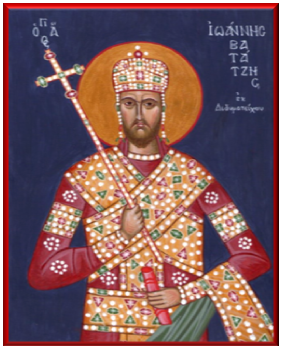On the fourth of this month [November], we commemorate the holy, glorious, divinely-crowned emperor John Doukas the Vatatzes and Merciful, born in Didymotheicho in the year 1193, and departed for the Lord in Nymphaeum, Magnesia in the year of our salvation 1254.
By St. Nikodemos the Hagiorite
Verses
Below you bore a crown as emperor,
Above you are now welcomed by the King, O glory!
+ + +
Having, O John, heaven as a dwelling place,
You meet Constantine, the great the former emperor.
John met his end and hastens towards the perfect on the fourth.
The Christ-loving Emperor John had as his homeland the great city of Adrianople, whose ancestors were leaders of the royal senate. His grandfather Constantine, called the Vatatzes, was a military commander under Manuel Komnenos (1143–1180). When the parents of this emperor died, he inherited a great amount of wealth, which he distributed to the poor, and provided offerings to the divine temples and churches. He then went to Nymphaeum in Bithynia, where at that time the palace and seat of the emperor of Constantinople was located. There he found his paternal uncle, a clergyman of the priesthood, near Emperor Theodore Laskaris (1204–1221). Through his uncle, he became friends with the emperor. He was not full of pride due to this friendship however, but he always presented himself before others with humility. Wherefore he was loved by all, having a revered disposition, being sensible in life, and possessing a gladsome expression in his eyes. He was easily approachable to everyone, mild, guileless, calm, conversant with everyone, with a gentle face. Having these virtues, he received as his wife the daughter of the emperor, whose name was Irene, after he fought against the Latin Coradus, who boasted in his strength. Having defeated him, he said: "Lord Jesus Christ help me."
After his father-in-law Emperor Theodore died, the gracious John came to rule as emperor in 1222. He therefore became a fervent protector of all those who were unjustly treated, showing measure in justice. He also came to be known to all as a source of mercy, which is why he came to be called "Merciful." Likewise he was known for his piety and zeal for the Orthodox faith. Wherefore the renowned one became the cause in his time for the Jewish race to be baptized. He also received zeal in his heart to bring about union between the Eastern Church and the Western, for which ambassadors were sent from Pope Gregory IX of Rome. And there was a dialogue between East and West, with the leader of this dialogue being Patriarch Germanos the New of Constantinople. And he would have brought about the longed for peace, if only the westerners were willing to retract the addition to the Symbol of Faith.
This merciful emperor heard a divine voice noetically say: "The crucified will rise, the boastful will fall, and the fallen and crushed will arise." This strengthened him, and he set out to slaughter in single combat the boastful Sultan Azeddin, who upon leaving Iconium, razed the cities along the valley of Meander. Having governed therefore in a God-loving manner the ship of the universal kingdom, the thrice-blessed one delivered his soul in peace into the hands of God at the age of seventy-two, and his honorable body was buried in the Monastery of the Savior Christ, which the emperor himself had built, and renamed Sosandra. Later, through a revelation of this same emperor, his holy body was transferred to the city of Magnesia.
A great miracle took place when his holy relic was transferred from this tomb and brought to Magnesia. For when his tomb was opened, a foul smell did not issue forth from it, but there came forth a fragrance and grace that was mixed with pleasure and sweetness, as if it was an aromatic and fragrant garden. And his corpse appeared as if it was seated on a royal throne, without having lost any limbs, having no bruises, or odor, or any sign of being dead. Despite the fact that he had been buried seven years before, it seemed as if he were alive, while his limbs moved naturally and his cheeks were pink. Even his royal robes were preserved as if they had been sewn that very day. In this way, God glorifies those who glorify Him. Since that time, this honorable relic which lies in Magnesia, has done many miracles, curing illnesses, exorcising demons, healing other sufferings as well, by the grace of God contained within, for all those who flee to him with faith.
Apolytikion in the First Tone
The radiant king and great boast of the faithful, the pride of Didymoteichou, let us honor John in hymns and spiritual odes, as we celebrate his memory, that we might richly be rewarded, crying out together: Glory to Christ Who glorified you, glory to Him Who crowned you, glory to Him Who grants to us through you healing for all.
Kontakion in the Fourth Tone
Today, John, the divine ruler, flees his earthly kingdom for the Kingdom of Heaven, leaving for eternity merrily.
Oikos
The Lord, Who foresaw before his birth the good nature of his soul, the uprightness of his heart, and his proclivity to choosing the good path, chose John Vatatzes to be ruler of the faithful. Having the name of mercy, and being arrayed with many graces, he now is alive in heaven, and after his death has been shown forth to be a spring of wonders and a stream of healings, and he drives away the spirits of error. Therefore, having rightly and manfully completed his path in God, and having kept the faith, he flees for the Kingdom of Heaven, leaving for eternity merrily.




